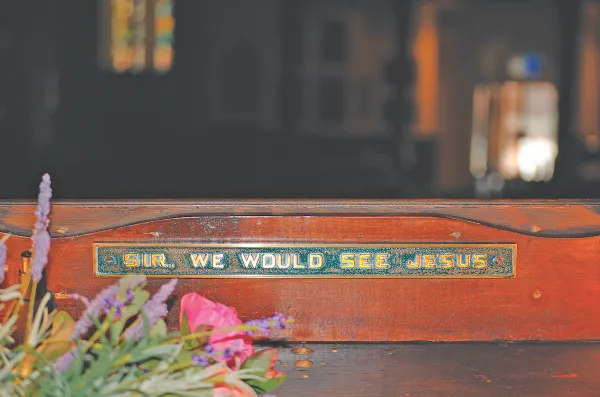The Church's Happy Gilmore Problem

I really don't know much of anything about golf. Certainly there's risk in trying to leverage illustrations using contexts which you know nothing about. I enjoy putt-putt as much as the next person, but truth be told, I've never once in my life stepped foot on an actual golf course.
But Happy Gilmore is still one of the funniest movies I've ever seen.
The title character, played by Adam Sandler is a hot-tempered, failed hockey player. He has a disproportionately powerful slap-shot, but almost no skating ability. After discovering his grandmother is about to lose her house to the IRS, he stumbles into professional golf, realizing his hockey-style swing can drive the ball to incredible, elite-level distances.
But.
Happy quickly realizes there's more to the game of golf than driving the ball 400 yards. He has to get the ball in the hole. Crushing the ball off the tee will gather a crowd at the driving range, and maybe even win a couple of under-the-table bets. But actually winning means he has to learn to putt.
Discipleship
A couple of years ago, a guy named Dennis who has been mentoring me planted the picture in my mind that Christian ministry can be illustrated by analogy to the game of golf. (I told him I knew nothing about the game, but he was convinced it was simple enough for even me to get it.) Sermons, he said, are like the drive. You're trying to get as much bang for buck as you can. You want your words to reach as far as possible. That phase of the game is important. And it has its place.
But you don't win by impressing everyone with your spectacular drive. You win when you get the ball to go into the hole.
Discipleship, Dennis told me, is when you get close with a person. When you get intentional. When you get truth to move from the abstract where our ears tickle, and maybe our wills might shout "A-men!", to being lived out in practice, and actually changing the life of the hearer. That's when you know the truth has gone into a heart - when you've gotten the ball in the hole. And that's when we win.
Why won't you just go home?!?
One of the more memorable moments in Happy Gilmore occurs when he's first on tour, and has in fact achieved for himself a respectable score with his monster drive, only to watch that that score disintegrate as he attempts to putt and repeatedly misses all over the green. At one point Happy starts talking to the ball, coaxing it gently at first, then explodes into a white-hot rage when it refuses to drop: “Why won’t you just go home?! That’s your home! Are you too good for your home?! Answer me!!!”
It’s hilarious. But it’s also a strangely accurate picture of modern evangelical frustration.
We’ve spent decades perfecting the “drive” — dynamic sermons with clever illustrations, and powerful delivery. And yet we’re somehow often stunned when the ball doesn’t go in the hole.
Despite the weekly fireworks from the pulpit, we see ongoing spiritual immaturity, continued worldliness infecting our people's priorities and decision-making, and we sit and wonder what went wrong. "Why won't the truth just go home!?!"
And too often rather than asking about our ministries' putting game, we wonder,
Maybe I need to drive the ball harder? Or more often?
I should be quick to mention here - there does exist such thing as a hole in one. Every once in a while, the drive lands perfectly. The ball drops in. Transformation happens right there on the spot. As Happy himself says: “That was so much easier than putting. I should just try to get the ball in one shot every time.”
If only.
But anyone who’s played golf — or pastored a church — knows how rare that is. You can’t build a whole game, or a whole ministry, around hole-in-ones... holes-in-one... you know what I mean.
But that's exactly what we've done in modern evangelicalism. We seem to care very little about whether the ball is going in the hole in any of our Churches. What we really want to know is who's the guy driving the ball each Sunday? How hard can he hit it, and how impressive is his swing?
Please hear me: I believe in preaching. I’m committed to it. I love it. But the longer I serve in ministry, the more I’ve come to see both its power and its limits. Preaching matters — but it's not the whole game.
Real fruit – lasting transformation – rarely happens by the drive alone. It takes a different phase of the game. A slower phase, despite a culture that worships speed. A closer and more intimate phase, despite a culture that hides behind screens.
Discipleship. Real, life-on-life discipleship. The kind of discipleship that doesn't just make us smarter - but makes us actually holier.
Insert Cliché Here
At this point, I could predictably (and somewhat ironically) lead us into a deep study on James 1; being doers of the word, not hearers only. Or maybe I could quote Jesus at the end of the Sermon on the Mount in Mathew 7 - Both houses heard the words of Christ. Both houses faced storms. The one who stood was the one who put those words into practice.
And again, those are vital, God-breathed, Spirit-inspired passages on which we need to both preach and meditate.
But here's my parting plea: Don't just nod and check a box in your mind that you know those verses. Some of you know James 1 and Matthew 7 from memory. Some of you can probably even tell me about the Greek.
But knowledge isn't the goal. Transformation is.
We have to get the ball in the hole.
It’s not enough to drive the truth down the fairway of someone’s life with a powerful sermon. It starts there. But at some point, we have to slow down, walk the green with them, and putt. And if it doesn't go in, we putt some more. And then some more.
Word into practice. Life into life.
Because that’s where the real game is won.



